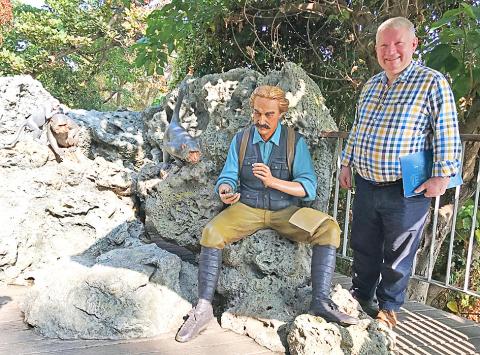A descendant of Robert Swinhoe, the first British consul in what was then known as Formosa, on Thursday visited the British Consulate at Takow (打狗英國領事館) in Kaohsiung, hoping to deepen his understanding of his ancestor.
Robert Swinhoe was stationed in Taiwan in July 1861 as the first British vice-consul, and he set up the first British Consular Office in Taiwan in Taiwanfu (modern-day Tainan), the Kaohsiung Bureau of Cultural Affairs said.
Three years later, Britain relocated the vice consulate from Taiwanfu to Takao (modern-day Kaohsiung), after the Port of Kaohsiung was opened.

Photo: Huang Chia-lin, Taipei Times
The vice consulate was upgraded to a consulate in 1865, with Swinhoe appointed its first consul.
Aside from his official capacities, Swinhoe was also a renowned biologist, introducing the first systematic catalog of Chinese and Taiwanese birds to Asia.
He also discovered more than one-third of birds in Taiwan, including Swinhoe’s pheasant, which is named after him.
Swinhoe was also responsible for certifying that the Formosan macaque was endemic to Taiwan.
Arriving in Taiwan on Thursday, Christopher Swinhoe-Standen visited the old consulate building, which is now a museum, accompanied by officials from the Kaohsiung Bureau of Tourism.
After taking a picture with Swinhoe’s statue on the premises — which showed Swinhoe discovering the macaques and the Odorrana swinhoana, or Swinhoe’s brown frog, which is also endemic to Taiwan — the bureau arranged a boat tour that took Swinhoe-Standen on the route his ancestor took when he cicumnavigated Formosa in 1858.
Learning about his ancestor’s past on the boat ride and taking in Kaohsiung’s excellent scenery was most enjoyable, Swinhoe-Standen said.
He would be sharing the photograph with his 91-year-old mother, Swinhoe-Standen said, adding that he was sure the story would be told for quite a while in the family.

SEPARATE: The MAC rebutted Beijing’s claim that Taiwan is China’s province, asserting that UN Resolution 2758 neither mentions Taiwan nor grants the PRC authority over it The “status quo” of democratic Taiwan and autocratic China not belonging to each other has long been recognized by the international community, the Mainland Affairs Council (MAC) said yesterday in its rebuttal of Beijing’s claim that Taiwan can only be represented in the UN as “Taiwan, Province of China.” Chinese Minister of Foreign Affairs Wang Yi (王毅) yesterday at a news conference of the third session at the 14th National People’s Congress said that Taiwan can only be referred to as “Taiwan, Province of China” at the UN. Taiwan is an inseparable part of Chinese territory, which is not only history but

CROSSED A LINE: While entertainers working in China have made pro-China statements before, this time it seriously affected the nation’s security and interests, a source said The Mainland Affairs Council (MAC) late on Saturday night condemned the comments of Taiwanese entertainers who reposted Chinese statements denigrating Taiwan’s sovereignty. The nation’s cross-strait affairs authority issued the statement after several Taiwanese entertainers, including Patty Hou (侯佩岑), Ouyang Nana (歐陽娜娜) and Michelle Chen (陳妍希), on Friday and Saturday shared on their respective Sina Weibo (微博) accounts a post by state broadcaster China Central Television. The post showed an image of a map of Taiwan along with the five stars of the Chinese flag, and the message: “Taiwan is never a country. It never was and never will be.” The post followed remarks

INVESTMENT WATCH: The US activity would not affect the firm’s investment in Taiwan, where 11 production lines would likely be completed this year, C.C. Wei said Investments by Taiwan Semiconductor Manufacturing Co (TSMC, 台積電) in the US should not be a cause for concern, but rather seen as the moment that the company and Taiwan stepped into the global spotlight, President William Lai (賴清德) told a news conference at the Presidential Office in Taipei yesterday alongside TSMC chairman and chief executive officer C.C. Wei (魏哲家). Wei and US President Donald Trump in Washington on Monday announced plans to invest US$100 billion in the US to build three advanced foundries, two packaging plants, and a research and development center, after Trump threatened to slap tariffs on chips made

Proposed amendments would forbid the use of all personal electronic devices during school hours in high schools and below, starting from the next school year in August, the Ministry of Education said on Monday. The Regulations on the Use of Mobile Devices at Educational Facilities up to High Schools (高級中等以下學校校園行動載具使用原則) state that mobile devices — defined as mobile phones, laptops, tablets, smartwatches or other wearables — should be turned off at school. The changes would stipulate that use of such devices during class is forbidden, and the devices should be handed to a teacher or the school for safekeeping. The amendments also say